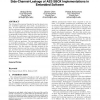Free Online Productivity Tools
i2Speak
i2Symbol
i2OCR
iTex2Img
iWeb2Print
iWeb2Shot
i2Type
iPdf2Split
iPdf2Merge
i2Bopomofo
i2Arabic
i2Style
i2Image
i2PDF
iLatex2Rtf
Sci2ools
166
click to vote
CASES
2010
ACM
2010
ACM
A comprehensive analysis of performance and side-channel-leakage of AES SBOX implementations in embedded software
The Advanced Encryption Standard is used in almost every new embedded application that needs a symmetric-key cipher. In such embedded applications, high-performance as well as resistance against implementation attacks is mandatory. In this paper, we compare and contrast three different software implementations of AES. The first two are based on cryptographic lookup tables, while the third uses bit-slicing. We analyze the performance and side-channel resistance of each implementation on two different FPGA platforms, one based on a PowerPC processor, and the second based on a LEON-3 soft-core processor. Our measurements show that, on embedded platforms, a bit-sliced AES implementation does not always outperform a lookup-table based AES implementation. We also present a detailed analysis of the side-channel resistance and the source of side-channel leakage, and show that our bit-sliced implementation has eight times more side-channel leakage than the lookup-table implementations. Hence, ...
Related Content
| Added | 10 Feb 2011 |
| Updated | 10 Feb 2011 |
| Type | Journal |
| Year | 2010 |
| Where | CASES |
| Authors | Ambuj Sinha, Zhimin Chen, Patrick Schaumont |
Comments (0)

